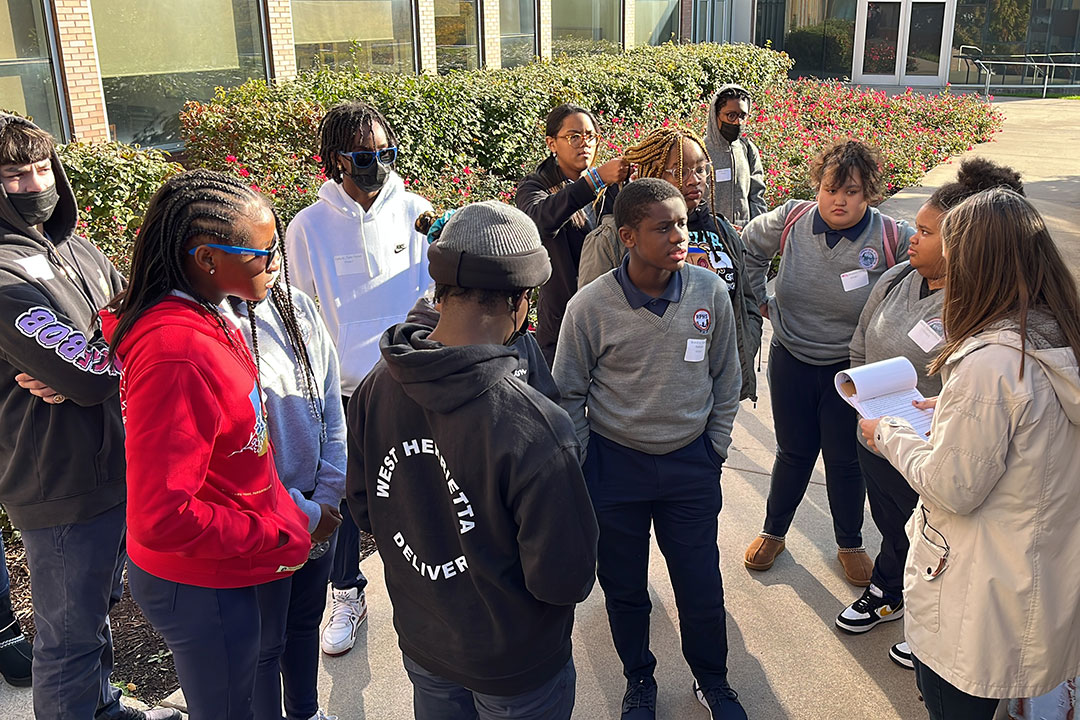RIT opens first Office of Youth Protection and Compliance
Director Cara Mulvaney is a one-person team working with campus partners to create awareness and promote youth safety on campus and in the community
Brit Milazzo
Freshmen from Rochester Prep High School visited RIT in the fall of 2022 during an event hosted by the K-12 University Center. The center, like all other programs and sites on campus, is required to follow policy through the Office of Youth Protection and Compliance when working with minors.
No sooner than when Cara Mulvaney was hired as Rochester Institute of Technology’s first director of the Office of Youth Protection and Compliance, the COVID-19 pandemic forced school closures, and the cancelation of all campus activities and events.
She was offered the job by Donna Burnette from the K-12 University Center the week before, and used time afterward to tirelessly research, and write policy and guidance for RIT through her office that is integral in creating awareness and promoting youth safety on campus and in the community.
“RIT hosts children on campus for any number of reasons throughout the year,” Mulvaney said. “I’m here to create some uniformity around how we prepare to host minors, and how we are preparing our staff and students to work with them, while assuring the campus and community that we have a safe environment for youth to have a successful and fun visit to campus and with our programs.”
Mulvaney to present at annual conference
Cara Mulvaney, director for the Office of Youth Protection and Compliance, will share best practices with other universities at the annual Higher Education Protection Network conference in October.
RIT’s Protection of Minors Policy applies to all university-related entities, including third parties that work on campus or in connection with RIT-offered programs involving minors. These individuals and groups are responsible for understanding and complying with policy and any implementing guidance established by the office. This also applies to RIT’s global campuses and study abroad sites.
On any given day, Mulvaney is responsible for making sure RIT and affiliated individuals know when minors are hosted on campus or with any other university-sponsored program. This includes answering questions about how policy, state regulations or federal laws apply to different programs, and interpreting what that means for those involved. It’s also making sure all processes are completed by the host or site, so policy requirements are met.
“A lot of what I’m doing now is building out and enhancing what is already in place to make it a more robust youth protection program,” Mulvaney said. “The hope is for it to be a quality program that will include greater involvement from the broader campus, as well as trainings and experiences that promote staff development in the area of youth safety and program quality.”
By working closely with all campus partners, Mulvaney helps interpret laws, regulations and RIT’s policy, so they are more easily comprehendible for others. This includes, but not limited to, working with the athletic department, environmental health and safety office, RIT housing, human resources, risk management, student affairs and more.
“It’s about raising awareness that this is not just about summer camps – it’s thinking about minors on campus in a context that might not have occurred to people before,” she said. “Everyone on campus has the potential to engage with minors in some capacity; it’s just remarkable.”




